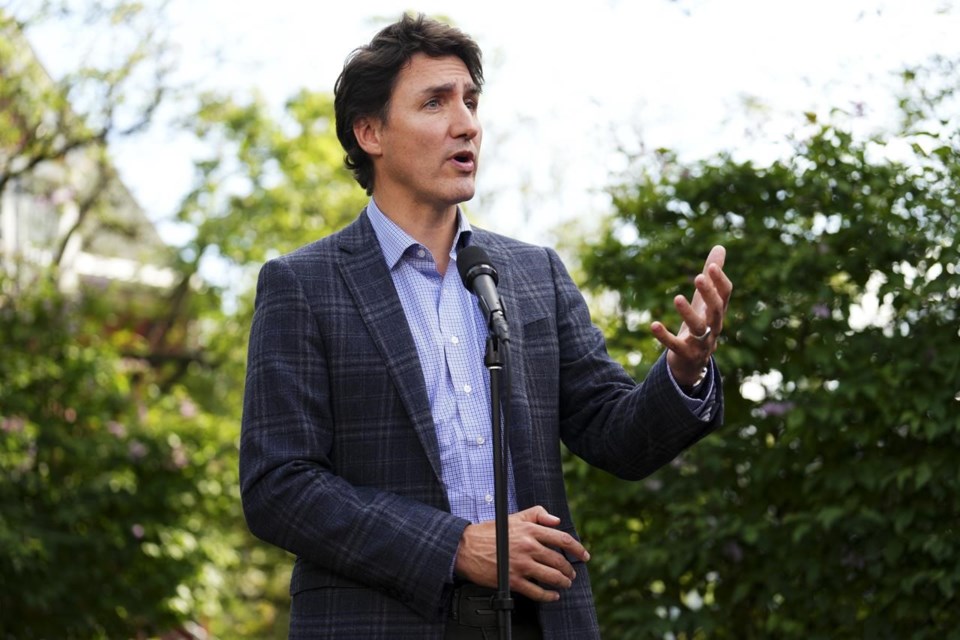REYKJAVIK, ICELAND — Canada is monitoring the situation in Russia after a short-lived armed rebellion by a mercenary leader this weekend, Prime Minister Justin Trudeau said Monday, adding a cautious approach is needed to avoid fuelling Russian propaganda.
A revolt staged Saturday by Yevgeny Prigozhin, leader of the mercenary paramilitary organization known as the Wagner Group, loomed large over a two-day gathering of Nordic leaders in Iceland, which Trudeau attended as a guest.
He returned to Canada from Iceland Monday night.
The events in Russia pushed security to the top of the agenda, which was organized around the theme of "societal resilience" at the site of a 1973 volcanic eruption.
Speaking to reporters on Monday, Trudeau said the recent upheaval under Russian President Vladimir Putin's watch was an "internal issue for Russia to work through," and pledged his continuing support for Ukraine.
Later in the day he elaborated on why he took that cautious approach.
"We are watching, of course, and we are reflecting carefully on what the implications could be either in Ukraine or elsewhere along eastern Europe, including in Latvia where Canadians are stationed right now," Trudeau told reporters.
"We need to make sure that we are not facilitating the liberal use of propaganda and disinformation that we know the Russians tend to do."
Putin released a video Monday blaming what happened on "Russia's enemies."
Prigozhin, who is feuding with Russia's top military leaders, led his troops through several Russian cities on his way to Moscow on Saturday, but changed his mind following an alleged deal with Putin that saw him exiled to Belarus.
Trudeau maintained that monitoring the situation — but not getting involved — is the right thing to do.
He spoke with both U.S. President Joe Biden and Ukrainian President Volodymyr Zelenskyy on Sunday.
Biden said Monday he was cautious about speaking publicly because he did not want to give Putin an excuse to blame the uprising on the West and on NATO, and he insisted the U.S. and the military alliance were not involved.
The gathering of Nordic leaders came just weeks before NATO allies are set to travel to Lithuania for a leaders' summit, which Norway's prime minister, Jonas Gahr Støre, said would be "historic."
Trudeau said Canada wants Sweden to be formally accepted into the alliance before the meeting begins on July 10.
NATO requires the unanimous approval of members to expand. Turkey accuses Sweden of being too lenient toward groups that Ankara says pose a security threat, including militant Kurdish groups and people associated with a 2016 coup attempt.
NATO Secretary-General Jens Stoltenberg said Monday he will call an urgent meeting in the coming days to try to overcome Turkish objections.
As he met with Swedish Prime Minister Ulf Kristersson on the sidelines of the two-day Nordic meeting, Trudeau said it was a "point of pride" that Canada was the first to ratify Sweden's accession into NATO. Canada was also the first to support Finland, which formally joined in April.
"There’s still a lot of work to be done," Trudeau said. "We need to make sure that we get you in by Vilnius in a couple of weeks."
Another crisis that dominated the agenda was climate change and protecting the Arctic ice and oceans.
Trudeau and the leaders left the meeting committing to enhanced collaboration on a range of topics, with climate action near the top.
Some experts have raised concerns over the paralysis the Arctic Council has found itself in since Russia invaded Ukraine in early 2022. The Nordic countries at the gathering, plus Canada and the U.S., have spoken out against co-operating with Russia since the war began.
Mathieu Landriault, director of the Observatory for Arctic Policy and Security, told The Canadian Press last week that the issue remains "fragile," saying without Russia — which has a huge Arctic coastline — the council lacks information about how climate change is affecting a major part of the region.
Scientists say the Arctic is experiencing some of the most acute effects of a warming planet, with defence experts adding the melting ice opens up new access to the region while aggressive powers such as Russia and China take note.
A parliamentary committee studying the Arctic also heard from at least one expert who says Canada needs to keep diplomatic channels with Russia open on specific issues like climate change.
Trudeau said leading up to the war, leaders had been willing to do just that, recognizing that Russia could be "a somewhat constructive partner" when it came to the Arctic and the protection of the environment.
"When we were talking about Syria, when we were talking about concerning behaviour by Russia elsewhere, we were often able to caveat it, 'Except we’re continuing to try to work constructively with them in the Arctic,'" said Trudeau.
He said Russia's invasion and Putin's decision to "throw aside the rules-based order," and the UN Charter made that more difficult.
Trudeau expressed hoped to return to collaboration with Russia.
"It’s going to be extremely difficult to do while they continue to send missiles and bombs into Kyiv, while they continue to kill innocent Ukrainians, while they continue to commit war crimes in Ukraine," he said.
"Russia needs to do more work on climate change, there’s no question about it, but that’s not one of their priorities right now."
While in Iceland Trudeau received a first-hand look at Carbfix, a carbon capture and storage facility nestled in its rolling countryside.
His government has earmarked billions for the development of green technology, and voiced a particular interest for carbon capture and storage as one solution to slash emissions in Western Canada, home to the country's oil and gas industry.
This report by The Canadian Press was first published June 26, 2023.
— With files from The Associated Press.
Stephanie Taylor, The Canadian Press



